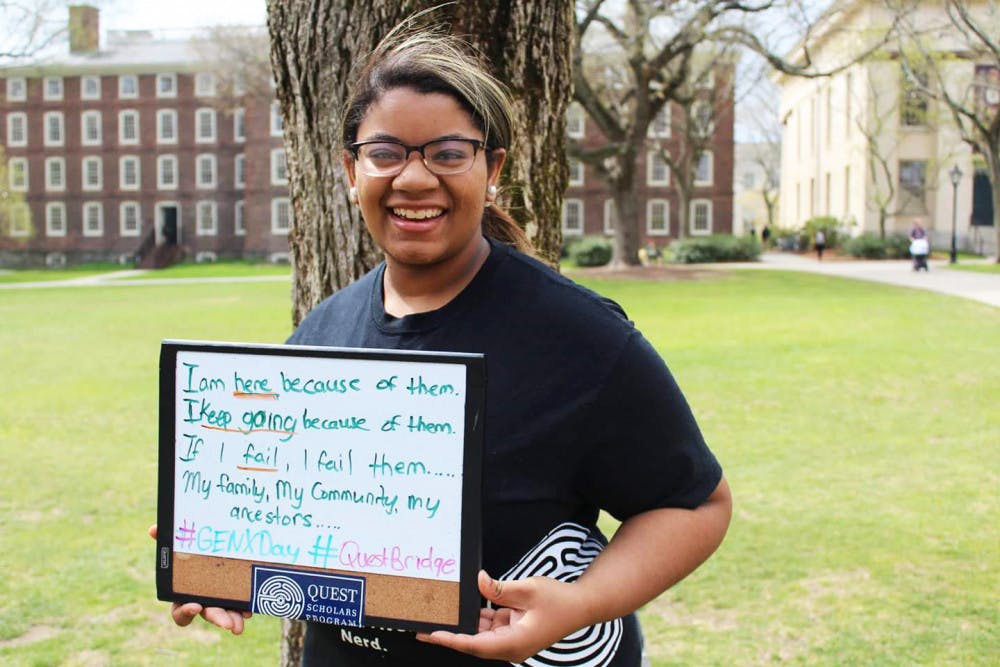Brown is celebrating its first-generation, low-income student community through Class Week at Brown, which is taking place Apr. 10 to Apr. 15 and was planned and presented by student group QuestBridge Scholars at Brown.
Class Week, which began in 2016, occurs annually and features events intended to guide campus conversation on the issues facing first-gen and low-income students.
Kathy Thach ’19.5 and Ariel Gonzalez ’19, co-presidents of QuestBridge Scholars at Brown, played leading roles in organizing Class Week this year. Gonzalez said they began planning Class Week in February and modeled the week’s schedule after last year’s format.
This year, Class Week started with a photo campaign on the Main Green and was followed by events like “Quest Storytime,” an opportunity for students to share how their identities shaped their experience at Brown. Thach said that the event was “closed-door and meant for low-income students only.”
“We told our stories, how we got here, what our inspirations are — that was another way to think about first-gen and low-income identity,” she added.
The week also included an event Thursday open to all students that featured a talk by Yanely Espinal ’11 titled, “Let’s Talk about Money: FLife after Brown.” The event focused on financial literacy and taught students how to budget money after graduating, according to the event’s Facebook page.
Friday, students will also have the opportunity to attend a faculty luncheon, which will include faculty members across all fields, Thach said. Gonzalez said that they also extended invitations to new faculty members in an effort to grow QuestBridge Scholars at Brown’s mentoring program.
Thach added that the program played a crucial role in assisting the first-gen and low-income students at Brown. “It’s bringing professors out of their offices, and … (the luncheon) allows these students to practice talking to professors.”
Chantel Brown ’17, who began Class Week in 2016, said that the week gives first-generation, low-income students the opportunity to “acknowledge (themselves) as a community (and) also have the broader Brown community acknowledge (their) existence.”
Brown said she was inspired to create Class Week at Brown after hearing about Columbia’s Class Month. It was important for students to understand how class at Brown differs from class in the United States, she added.
“Brown first and foremost is an elitist institution, (and) … college access in general requires some socioeconomic privilege,” she said.
“Talking about class and its relationship with Brown is important because you have to recognize what you lack as a low-income student at Brown but (also understand) what you have that other people may not have,” Brown said.
The week also allows students to connect with each other and give upperclassmen a chance “to share their experience, … acknowledging how class played a role in their time here,” she added.
Thach said she hoped to see participation from other student communities on campus during Class Week. “That doesn’t have to be active participation but just thinking about how your identity shapes you. … This a week for you to understand privileges, what class awareness is.”
Gonzalez also said that other first-generation and low-income student groups on campus helped QuestBridge Scholars at Brown plan Class Week through advertising efforts. “We want all first-gen (and low-income) students” to be involved, he added.
Because she identifies as a first-generation, low-income woman of color, Thach knew that she would be at a disadvantage by coming to Brown, she said. Thach added that while she had a hard time during her first semester, she found affirmation and empowerment from the support network that existed at the University to help students like herself.
“It’s as simple as mentorship, friendship and mutual understanding” that makes the first-generation, low-income community at Brown so “amazing,” Thach said.
Thach also added that being a first-generation, low-income student did not mean you have to be a part of all the first-gen and low-income student groups on campus.
“Even if you’re not taking part in First Gens or Quest Scholars, we’re still working for you. We’re still trying to make Brown a better place for you. … You don’t have to contribute (to the community) to benefit (from) it,” she said.





